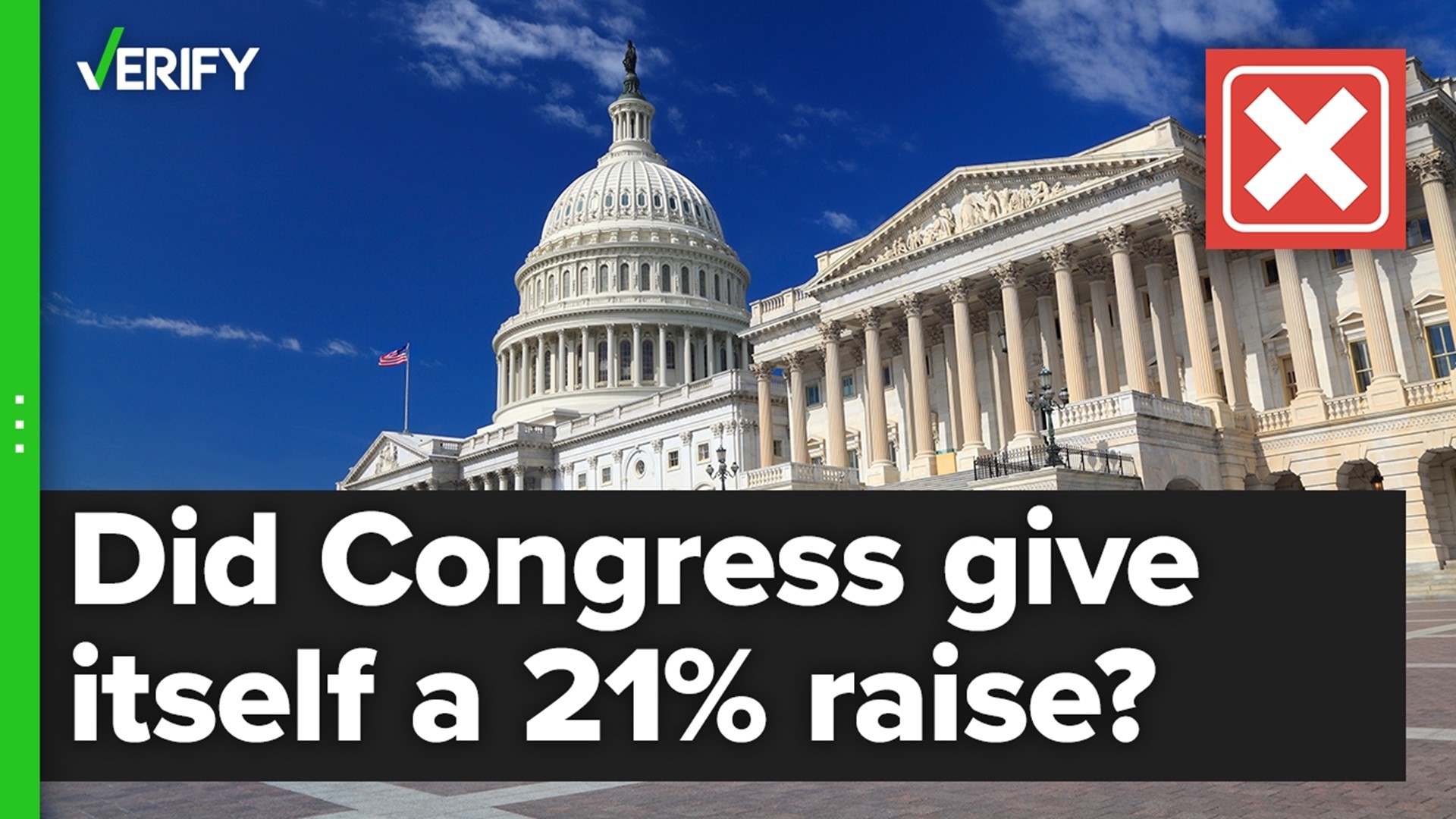After President Joe Biden signed the $1.5 trillion omnibus spending bill into law on March 15, claims about an alleged pay raise for Congress members began circulating on social media.
“While you are paying record prices at the grocery store and gas pump, our politicians in Congress voted for a 21% pay raise for themselves,” Buzz Patterson, a former congressional candidate, wrote on Twitter. Donald Trump Jr. repeated the claim in a tweet.
VERIFY viewer Nancy also texted the team to ask whether Congress members gave themselves a 21% pay raise.
THE QUESTION
Did Congress members give themselves a 21% pay raise?
THE SOURCES
- U.S. Library of Congress
- U.S. House of Representatives Ethics Committee
- Congressional Research Service, nonpartisan public policy research institute of the U.S. Congress
- Summary of omnibus spending bill from Senate Appropriations Committee members
THE ANSWER
No, Congress members did not give themselves a 21% pay raise. A freeze on Congress members’ pay has been in place since 2009.
WHAT WE FOUND
Some of the claims about a salary increase in the 2022 omnibus spending bill passed by Congress and signed into law by Biden on March 15 stemmed from a misleading Front Page Magazine headline. It claimed Congress gave itself a 21% pay raise, but the article notes that it’s “not technically a pay hike for Congress members.”
The Consolidated Appropriations Act of 2022 includes a section on “Members’ Representational Allowances (MRA).” This allotted $774,400,000 is for “members’ clerk hire, official expenses of members and official mail.”
In 2021, the MRA was $640 million. It increased by $134,000,000 – or exactly 21% – this year.
But the MRA has no bearing on Congress members’ salaries. Regulations state that the funds can only be used for “ordinary or necessary expenses” as part of the members’ duties or those of their employees, the U.S. House of Representatives’ Ethics Committee explains. Those official expenses can include staff, travel, mail, office equipment and supplies, and district office rental, according to a report from the Congressional Research Service (CRS), a nonpartisan public policy research institute for Congress.
“The MRA may not be used to pay for any expenses related to activities or events that are primarily social in nature, personal expenses, campaign or political expenses, or House committee expenses,” according to the Ethics Committee. “Members may be personally liable for misspent funds or expenditures exceeding the MRA.”
Furthermore, Congress members haven't received a pay increase since January 2009 when their salary was increased by 2.8% to $174,000, according to a CRS report from January 2022.
The omnibus spending bill continues the provision to freeze Congress members’ pay that has been in place since 2009, “preventing any pay increases in FY22,'' Republican members of the Senate Appropriations Committee wrote in a summary of the spending bill.
Several House Democrats voiced their support for the 21% MRA increase, saying it will help Congress “attract and retain the best and brightest” staff members.
“We were very glad to see that the Omnibus appropriations package unveiled this morning includes the 21% MRA increase that we have been pushing to secure,” House Majority Leader Steny M. Hoyer and House Democratic Caucus Chair Hakeem Jeffries wrote in a statement. “With Congressional staffers moving on to more competitive opportunities after an average of just three years, creating the space for raising staff pay across the board is critical to recruiting and retaining the best and brightest to help us serve our constituents, particularly in district offices that engage most directly with them on casework and services.”
Correction: The original version of this story stated that the omnibus spending bill increased the Members' Representational Allowance by $13,440,000. The correct number is $134,000,000. This story has been updated to reflect that correction.
More from VERIFY: No, Congress is not considering a salary cap for nurses

